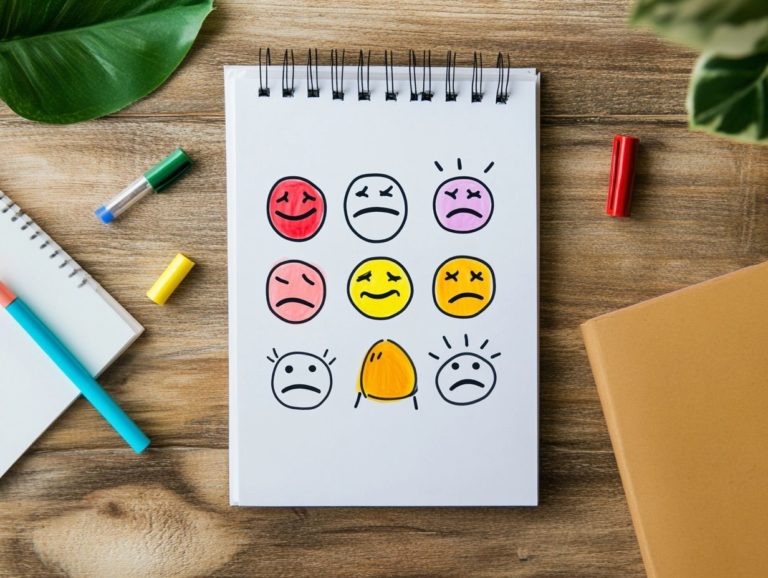Creating a Toolkit for Emotional Awareness
Contents
- Understanding Emotional Awareness
- Key Takeaways:
- What is Emotional Awareness?
- Why is Emotional Awareness Important?
- What are the Benefits of Developing Emotional Awareness?
- How to Develop Emotional Awareness?
- What are the Tools for Emotional Awareness and Emotional Healing?
- Enhancing Emotional Awareness and Mental Health
- Frequently Asked Questions
- What is emotional awareness?
- Why is creating a toolkit for emotional awareness important?
- What should be included in a toolkit for emotional awareness?
- How can I use an emotional toolkit for emotional awareness in my daily life?
- Can anyone benefit from using an emotional toolkit for emotional awareness?
- Do I need to seek professional help in addition to using an emotional toolkit for emotional awareness?
Understanding Emotional Awareness
Emotional awareness is an essential skill that can elevate your understanding of yourself and enrich your relationships with others. It is crucial for emotional wellness and mental well-being.
This article explores emotional awareness. It discusses its significance and the many benefits, like heightened self-awareness and increased empathy.
Understanding emotional awareness can lead to better emotional control and emotional improvement.
Discover powerful strategies to develop this essential skill today! These include mindfulness practices, journaling, and effective tools such as mood tracking apps and emotional healing techniques.
Embark on a journey to build your emotional toolkit and cultivate deeper connections in your life. This process will also aid in resilience building and stress reduction.
Key Takeaways:

- Emotional awareness leads to improved self-awareness, better relationships, effective stress management, and enhanced empathy.
- Mindfulness, journaling, therapy, and identifying triggers help develop emotional awareness and vocabulary.
- Tools like emotional check-ins and mood tracking apps aid in building emotional awareness and coping skills.
What is Emotional Awareness?
Emotional awareness is your capacity to recognize and understand both your emotions and those of others. This skill is fundamental to emotional intelligence and plays a vital role in managing relationships and personal well-being.
By cultivating emotional awareness, you equip yourself to navigate your emotional responses with greater efficacy. This enriches your emotional toolkit and sets the stage for emotional healing and improved mental health.
When you grasp your emotional triggers, you can pursue emotional regulation, fostering resilience and emotional stability in your life.
Why is Emotional Awareness Important?
Emotional awareness is essential because it gives you the power to manage your emotions effectively. This paves the way for better communication and stronger interpersonal relationships.
With a high level of emotional awareness, you can identify your emotional triggers and responses. This allows you to cultivate healthier habits and make informed decisions that enhance your mental well-being and social connections.
Self-awareness fosters emotional growth, enabling you to develop coping strategies that contribute to a more balanced and fulfilling life, improving your relationships with others.
What are the Benefits of Developing Emotional Awareness?
Developing emotional awareness provides numerous benefits that can profoundly elevate your quality of life, especially in areas like emotional regulation, stress management, stress relief, and building healthy relationships.
As you become more attuned to your emotions and those of others, you ll find yourself responding more effectively to emotional challenges. This increased awareness fosters greater emotional stability and resilience.
With this enhanced emotional toolkit at your disposal, you will facilitate your own emotional healing and promote better communication, forging stronger social connections that lead to improved relationships.
Ultimately, this contributes to a robust foundation for your mental health, cultivating a more positive mindset and a healthy lifestyle.
1. Improved Self-Awareness
Improved self-awareness stands out as one of the most significant benefits of developing emotional awareness. It allows you to gain a profound understanding of your emotional responses and triggers, paving the way for emotional growth and healing.
With heightened self-awareness, you can identify your emotional needs and actively work toward fulfilling them. This contributes to your emotional stability and overall mental well-being.
This journey of self-discovery often leads to enhanced emotional intelligence. You learn to navigate your feelings and reactions with greater ease.
By recognizing patterns in your emotions, you can cultivate healthier relationships and articulate your needs more effectively. This process fosters resilience and adaptability when faced with challenges.
Understanding your emotions not only aids in personal growth but also serves as a powerful tool for conflict resolution. It promotes a more compassionate perspective toward yourself and others.
Ultimately, as you become more attuned to your inner landscape, you’ll find that you can transform emotional challenges into opportunities for growth. This leads to a more fulfilling and balanced life, achieving emotional wellness.
2. Better Relationships
Better relationships blossom from heightened emotional awareness. This elevates your ability to empathize and forge deeper connections with others.
When you grasp your own emotions and those of the people around you, your communication becomes more effective. This allows you to tackle conflicts with emotional intelligence.
This ultimately cultivates stronger social bonds and promotes healthier interpersonal dynamics. This profound understanding fosters empathy, enabling you to appreciate another person’s perspective and feelings.
As a result, you experience more authentic interactions. As you navigate your emotions alongside those of your peers, communication transforms into a more open and honest exchange.
This minimizes misunderstandings that often spark conflicts and creates emotional connections. Emotional awareness arms you with essential tools for conflict resolution.
This allows you to approach disagreements with a collaborative mindset rather than a confrontational one. This shift not only enhances your personal relationships but also nurtures an environment where mutual respect flourishes.
This greatly contributes to your overall well-being in social interactions.
3. Effective Stress Management

You can enhance your stress management by becoming more emotionally aware. This allows you to pinpoint your stress triggers and employ suitable coping strategies to alleviate anxiety and emotional challenges.
By incorporating mindfulness practices, which include focusing on the present moment, and relaxation techniques, you can better manage your emotions. This leads to improved mental well-being and emotional resilience.
When you become attuned to your emotional landscape, you gain the ability to identify what specifically elevates your stress levels. This may include work pressures, interpersonal conflicts, or even those self-imposed expectations that can weigh you down.
This heightened awareness is essential for effectively utilizing relaxation techniques such as deep breathing, yoga, or guided meditation. All of these serve to soothe both your mind and body, aiding in quick stress relief.
Emotional coping mechanisms like journaling can help you articulate your feelings, transforming them into something more manageable. Engaging in creative outlets is another effective strategy.
Ultimately, nurturing your emotional awareness not only aids in regulating stress but also fosters a greater sense of control and balance in your everyday life. This is essential for managing emotions.
4. Enhanced Empathy
Enhanced empathy is a remarkable benefit of emotional awareness, enabling you to connect with the feelings and experiences of others on a deeper level. By understanding your own emotional states, you can better grasp the emotions of those around you, leading to stronger social connections and more fulfilling relationships grounded in emotional intelligence and emotional wellness.
This profound understanding enhances your communication with others, allowing you to handle conversations with care and understanding. When you practice enhanced empathy, you naturally engage in active listening and respond thoughtfully, fostering a safe environment for open dialogue.
As a result, conflicts can be resolved with greater ease, and trust can blossom, forming the foundation of healthy relationships and better communication. This emotional attunement doesn’t just benefit personal interactions; it broadens your social network, creating a space where individuals feel valued and supported.
Ultimately, by embracing your emotional awareness, you enrich not only your own life but also positively impact the lives of others, nurturing a more compassionate community. It also helps with providing emotional and mental health support. By cultivating enhanced empathy, you’re not just improving your relationships; you’re also contributing to a kinder, more understanding world.
How to Develop Emotional Awareness?
Developing emotional awareness is a journey that you can enhance through a variety of practical strategies designed to boost your emotional intelligence and build a comprehensive emotional toolkit.
Consider incorporating mindfulness practices, journaling, and seeking therapy into your routine; these approaches will give you the power to manage your emotions effectively while enhancing your communication with others.
By actively engaging in these methods, you can cultivate a deeper emotional awareness that paves the way for emotional healing and resilience, contributing to your emotional wellness.
1. Practice Mindfulness
Practicing mindfulness is among the most effective methods to enhance your emotional awareness. It encourages you to immerse yourself in the present moment, observing your thoughts and feelings without judgment. Through mindfulness meditation, you can develop greater emotional regulation, enabling you to navigate your emotions more effectively and reduce stress. This process also supports anxiety and depression management.
This practice can manifest in various forms. Mindful breathing focuses your attention on your breath, anchoring you in the present moment. Body scans promote awareness of physical sensations, helping you identify areas of tension. Guided visualizations foster a profound sense of calm and relaxation. These exercises are essential for managing stress and improving your emotional health.
Incorporating mindful movements like yoga or tai chi allows you to connect with your body, physical sensations, and emotions in a dynamic way. By engaging in these exercises, you cultivate a deeper understanding of your emotional landscape, which enhances your ability to respond to challenging situations, manage emotions, and improve your overall well-being.
2. Journaling
Journaling is an invaluable tool for enhancing your emotional awareness, offering you a dedicated space for self-reflection and exploration of your emotional landscape. By putting pen to paper and articulating your feelings and thoughts, you can expand your emotional vocabulary and cultivate effective coping strategies to navigate your emotions and mental health challenges more adeptly.
This practice not only helps clarify those complex feelings swirling around in your mind but also nurtures a deeper understanding of your personal triggers and patterns essential components of emotional intelligence. Techniques like free writing, where you write continuously for a designated period without fretting over grammar or coherence, can unearth hidden emotions. Using prompts such as “What made me feel grateful today?” or “Describe a moment when I felt overwhelmed” can inspire profound self-reflection, leading to a cathartic release.
Over time, these reflective practices will enhance your coping mechanisms, giving you the power to face challenges with greater resilience and self-awareness.
Start your journaling journey today and discover the power of self-reflection for emotional growth!
3. Seek Therapy
Seeking therapy can significantly enhance your emotional awareness, offering you professional support and guidance as you navigate your feelings.
Through the therapeutic process, you have the opportunity to delve into your inner thoughts and emotions in a safe and nurturing environment, where trained professionals employ a range of therapeutic modalities tailored to your needs. For instance, cognitive-behavioral therapy (CBT) empowers you to identify and transform negative thought patterns, while mindfulness-based approaches encourage you to embrace present-moment awareness, deepening your connection to your emotions. Narrative therapy allows you to reframe your personal stories, fostering understanding and promoting emotional healing.
By engaging in these therapeutic practices, you can cultivate a stronger sense of self, enhance your emotional intelligence, and develop healthier coping strategies. This journey ultimately leads to more fulfilling relationships, better mental health, and an enriched quality of life.
4. Identify Triggers

Identifying emotional triggers is an essential step in developing your emotional awareness, allowing you to understand the factors that influence your emotional responses. By recognizing these triggers, you can implement effective emotional regulation strategies, helping you navigate emotional challenges with greater resilience and insight. This can also aid in stress management and anxiety reduction.
To embark on this journey, consider starting a journal where you note situations that evoke strong emotional reactions. Reflecting on these entries can reveal patterns and help you pinpoint specific triggers, whether they arise from external stimuli or internal beliefs. This practice is a fundamental step in building an effective emotional toolkit.
Practicing mindfulness techniques, such as deep breathing or meditation, encourages a deeper connection with your thoughts and feelings, facilitating better recognition of emotional responses as they emerge. These mindfulness exercises are essential for emotional regulation and stress reduction.
Engaging in open dialogues with trusted friends or therapists can also offer valuable insights, as they may help you uncover blind spots in your understanding. This social support is crucial for emotional growth and resilience building.
Ultimately, developing emotional awareness empowers you to process your feelings more constructively, leading to healthier emotional regulation and a more balanced life. This practice also encourages emotional stability and resilience building.
What are the Tools for Emotional Awareness and Emotional Healing?
You have a wealth of tools at your disposal to cultivate emotional awareness and emotional healing, each designed to enhance your emotional intelligence and understanding in its own distinct way.
Consider incorporating emotional check-ins, mood tracking apps, and emotional intelligence assessments into your routine; these resources can help you monitor your emotional states over time, manage emotions, and foster personal growth.
Moreover, engaging in guided meditations can deepen your emotional exploration and enrich your mindfulness practice.
1. Emotional Check-Ins and Emotional Support
Emotional check-ins are an invaluable practice for enhancing your self-awareness and emotional intelligence, offering you a chance to pause and reflect on your current emotional state. By routinely assessing your emotions and responses, you can cultivate a deeper understanding of your mental health and develop more effective coping strategies, reducing anxiety and depression.
This introspective practice encourages you to consider how specific experiences and interactions influence your feelings throughout the day. Incorporating simple prompts like What am I feeling right now? or What triggered this emotion today? can facilitate deeper self-reflection. Taking a moment to explore the reasons behind these emotions can lead to significant insights and emotional control.
Regular emotional check-ins not only promote emotional regulation but also strengthen your interpersonal relationships by fostering empathy and understanding. Ultimately, engaging in this process can enhance your overall well-being, making you more resilient in the face of life s challenges. This practice supports emotional connections and social support.
Enhancing Emotional Awareness and Mental Health
2. Mood Tracking Apps and Stress Management
Mood tracking apps are exceptional tools for elevating your emotional awareness. They allow you to consistently monitor your emotional states and identify patterns over time. By utilizing these apps, you can engage in meaningful self-reflection and gain valuable insights into your emotional growth and coping strategies. This practice can help manage stress and anxiety.
These applications often come packed with features like mood diary entries, customizable scales, and reminders to check in with your feelings throughout the day. This encourages consistent engagement with your emotional health. Popular options such as Daylio, Moodfit, and Moodpath not only streamline the tracking process but also deliver insightful analytics and reports about mood trends. These tools are essential for emotional regulation and resilience building.
By gaining a clearer understanding of your emotional landscape, you can recognize triggers and develop more effective coping mechanisms. Ultimately, this bolsters your emotional resilience, promoting a more balanced and fulfilling lifestyle.
3. Emotional Intelligence Assessments and Mental Health Support
Emotional intelligence assessments provide a structured framework to evaluate your emotional awareness and intelligence. They offer valuable insights into your emotional capabilities and highlight areas for improvement. Engaging in self-assessment helps you pinpoint specific emotional challenges and cultivate targeted coping strategies for your emotional growth and mental health.
These assessments typically blend various methodologies, including questionnaires and situational judgment tasks. This enables you to measure your responses to a range of emotional scenarios. Such tools are instrumental in recognizing patterns in your emotional behavior, ultimately enhancing your people skills and fostering greater empathy.
By gaining a deeper understanding of your emotional triggers, you can make informed decisions that positively impact your relationships and workplace dynamics. This can also improve stress management and conflict resolution strategies.
Harnessing the results from these assessments leads to improved conflict resolution strategies and better stress management techniques. This promotes your overall mental wellness and personal development, creating a powerful foundation for a positive mindset!
4. Guided Meditations and Relaxation Techniques
Guided meditations offer a structured path to mindfulness that greatly enhances your emotional awareness and facilitates emotional healing. By following these practices, you learn to focus on your emotions and physical sensations, promoting relaxation and alleviating stress.
These meditations act as a gentle introduction to the realm of introspection. They allow you to delve into your inner thoughts without feeling overwhelmed. As a beginner, starting with shorter sessions may be helpful, gradually extending them as you grow more comfortable and familiar with the process. Incorporating techniques like deep breathing and visualization can further enrich your experience.
By tapping into resources from reputable platforms like HelpGuide or BetterHelp, or mindfulness apps, you can access a diverse array of guided sessions tailored to your personal needs. Engaging in regular guided meditation nurtures a deeper connection to yourself and the world around you while cultivating your emotional literacy.
Unlock more strategies for enhancing your emotional awareness and boosting your mental health by visiting HelpGuide today!
Frequently Asked Questions

What is emotional awareness?
Emotional awareness is the ability to recognize and understand our own emotions, as well as the emotions of others. It involves being aware of how our emotions affect our thoughts, behaviors, and relationships. This awareness is crucial for mental well-being and better communication.
Why is creating a toolkit for emotional awareness important?
Creating a toolkit for emotional awareness will help you take control of your emotions and improve your overall well-being. It can also enhance your relationships with others, provide mental health support, and help you handle tough situations more effectively.
What should be included in a toolkit for emotional awareness?
An emotional toolkit should include resources and strategies for identifying and regulating emotions. This may consist of self-reflection exercises, journaling prompts, and relaxation techniques.
It should also provide information about mental health, emotional intelligence (the ability to understand and manage your emotions), and how to seek mental health support when needed. Incorporating sensory experiences and quick stress relief techniques enhances emotional wellness.
How can I use an emotional toolkit for emotional awareness in my daily life?
You can use your emotional toolkit in various ways. Set aside time for self-reflection, practice mindfulness exercises, and utilize helpful coping mechanisms when facing challenging emotions or situations.
Incorporating deep breathing and meditation techniques can help manage your emotions and improve emotional stability.
Can anyone benefit from using an emotional toolkit for emotional awareness?
Absolutely! Anyone can benefit from utilizing an emotional toolkit. Whether you’re experiencing anxiety, depression, or emotional challenges, or simply want to boost your emotional well-being, a toolkit provides valuable resources and support.
It can also contribute to better communication and improved relationships.
Do I need to seek professional help in addition to using an emotional toolkit for emotional awareness?
An emotional toolkit can be very beneficial on its own. However, it’s crucial to seek professional help if you struggle with your mental health. A therapist or counselor can provide personalized support.
Platforms like BetterHelp or professionals like Dr. Jeanne Segal are great options to consider. Their guidance can further aid in personal growth, emotional healing, and resilience building.






